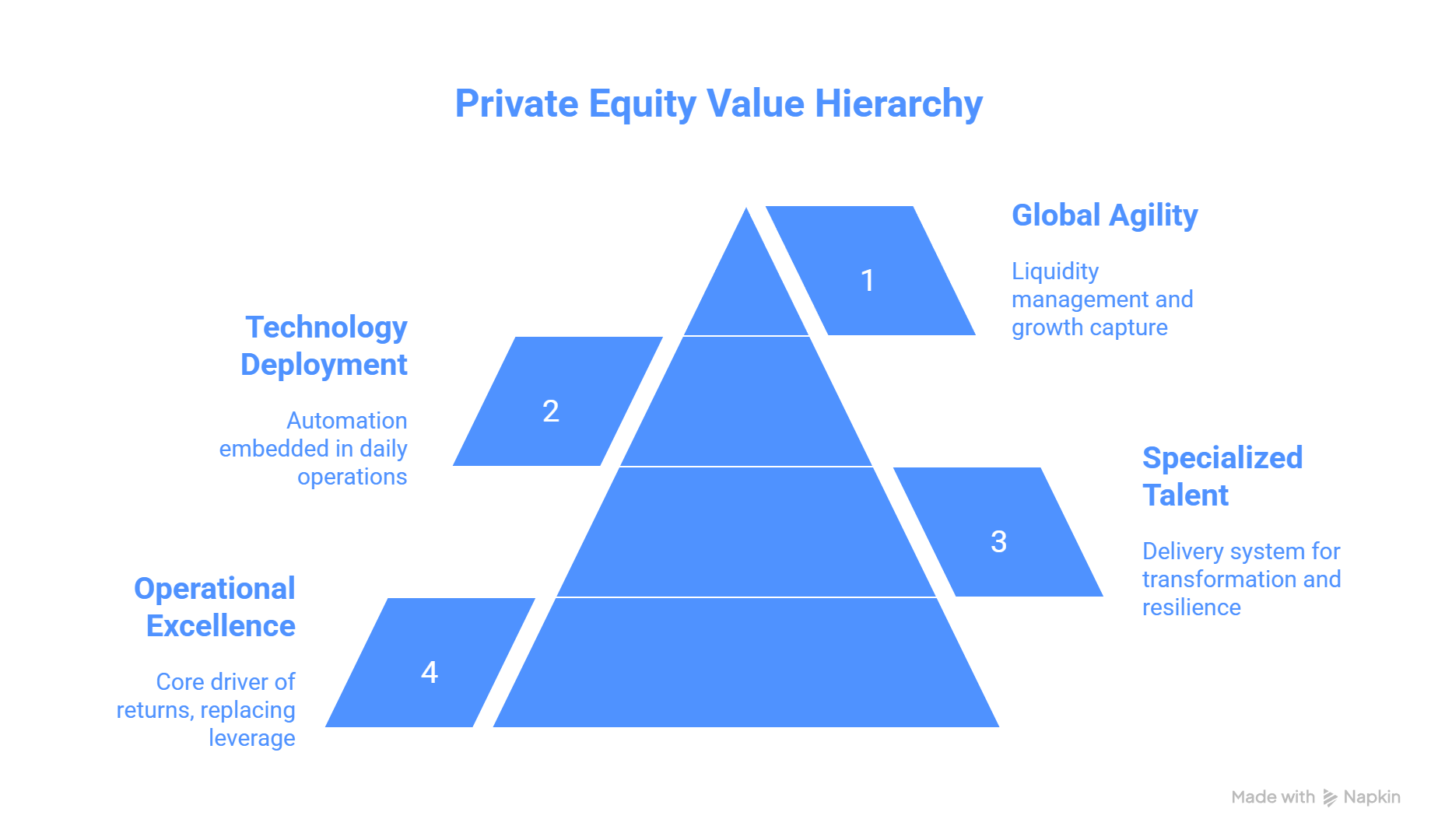The Great Private Equity Reset: From Financial Engineering to Operational Command
Oct 31, 2025
Private equity is undergoing its most significant transformation in over four decades. The classic model (buy low, lever up, sell high) is rapidly losing potency. With interest rates elevated, exit markets constrained, and competition intensifying, the old levers of financial engineering no longer suffice.
What's emerging is a new era where returns are driven by operational mastery, talent precision, and technology deployment. This shift is not cosmetic. It is structural. And it is reshaping everything from due diligence to exit strategy.
The Operational Imperative
The center of gravity in value creation has shifted. According to McKinsey's 2024 Private Markets Review, operational improvements now drive over 50% of PE returns, up from just 35% a decade ago. This is no incremental change. It represents a wholesale restructuring of the value architecture in private markets.
Today's questions are no longer "What multiple can we pay?" but "Which operational levers can we pull, at what cost, with what velocity?" Firms have more than doubled their resource allocation to operational due diligence since 2015. Three out of four maintain dedicated portfolio operations teams. Financial engineering has become a support function. Operational transformation is now the engine.
A managing partner at a global PE firm put it plainly: "When debt costs 8% instead of 3%, and exit markets are sluggish, the only real path to value is to fix the business."

The Operating Partner Conundrum
Just as operations take center stage, PE faces a crisis in its most important human role: the Operating Partner.
The numbers tell a troubling story. A 3x to 10x gap between OP talent supply and demand. Hiring cycles exceeding 180 days. Compensation inflation without clarity of role.
Even more problematic is structural ambiguity. Operating Partners are expected to be transformation architects, performance coaches, management advisors, and sometimes interim executives. Yet they are rarely given true authority and often remain outside of carry pools or decision-making forums.
As one senior industry advisor remarked: "Private equity still hasn't figured out how to use Operating Partners. And it's costing them alpha."
The misalignment extends to compensation. While Operating Partners now contribute an estimated 47% of total returns in buyout transactions, their pay remains 30% to 50% lower than deal professionals at the same level of seniority. This gap signals a fundamental disconnect between the value operators create and the recognition they receive.
Limited partners are taking notice. Compensation misalignment reveals whether value creation is institutionalized and repeatable, or merely marketing language layered over a transactional core.
AI: Both Catalyst and Disruption
Artificial Intelligence is rapidly becoming the most polarizing lever in private equity. According to PwC, firms that deploy AI effectively in portfolio companies achieve up to 2.1x higher EBITDA growth. The potential spans the entire investment lifecycle, from sourcing and screening to pricing, integration, and performance monitoring.
But AI also threatens the industry's traditional moat: pattern recognition and instinct. Many PE firms remain stuck in "AI theater," showcasing superficial chatbots while legacy systems remain untouched. The gap between AI experimentation and AI execution continues to widen.
As one digital transformation leader noted: "AI won't replace private equity, but it will render much of it obsolete unless firms start embedding it in how they operate, not just how they pitch."
The firms winning with AI are those treating it as infrastructure, not innovation theater. They're rebuilding workflows, retraining talent, and rethinking how decisions get made across the investment lifecycle.
Liquidity is Not a Given
The private equity flywheel (buy, grow, exit, repeat) is no longer smooth. Traditional exit routes remain clogged, leading to a liquidity crunch that's forcing firms to rethink geographies and transaction types.
Continuation funds and secondaries have moved from edge case to essential. Emerging markets, particularly the Middle East, have become magnets for capital seeking yield and velocity. In Saudi Arabia, venture funding has surged 20x in seven years, reflecting a tectonic shift in global allocation patterns.
The IPO window remains unpredictable. Strategic buyers are more selective. Secondary buyouts face valuation pressure. As a result, firms are holding assets longer than planned, requiring deeper operational capabilities to continue driving value beyond the traditional hold period.
The next generation of winners will be defined not only by deal quality, but by their global agility: knowing where capital can exit, and where it can grow.
Human Capital as the Final Competitive Moat
In a market where capital is abundant and data ubiquitous, talent has become the last true differentiator.
EY's 2024 PE survey found that 89% of general partners rank attracting and retaining operational talent as their top challenge, exceeding even deal flow concerns.
Top-tier firms are responding by building formalized human capital engines. Leadership pipelines mapped against transformation scenarios. Day-zero readiness protocols for executive deployment. Compensation models tied directly to execution milestones.
This is more than HR optimization. It is the emergence of talent strategy as investment strategy.
The most sophisticated firms no longer participate in traditional talent wars. They engage in talent arbitrage, building proprietary ecosystems that identify, develop, and retain operators with genuine executional depth regardless of background. These operators emerge from Big Four transformation practices, global BPO organizations, corporate development teams, and functional leadership roles at portfolio companies.
By sourcing from non-obvious channels and aligning compensation with delivered impact, these firms build deeper benches at lower cost and outperform peers by 2 to 3 points of IRR.

The New Value Hierarchy in Private Equity
The emerging value creation model is structured around four interdependent pillars:
Operational Excellence serves as the primary driver of returns, replacing financial leverage as the core engine of value.
Specialized Talent functions as the delivery system for transformation, execution, and resilience across portfolio companies.
Technology Deployment moves from AI experimentation to core process automation embedded in daily operations.
Global Agility enables liquidity management and growth capture across markets, geographies, and exit pathways.
This is no longer theory. It is the new baseline for competitive performance in private markets.
The Bottom Line
The private equity reset is real, and it is irreversible.
Success now requires different tools, different metrics, and a fundamentally different mindset. It demands firms build the capabilities to transform, not just transact. The winners will be those who invest not only in companies, but in systems, people, and platforms that can deliver repeatable results under pressure.
As one veteran investor said: "It's no longer about buying right. It's about building right."
The firms that adapt fastest will define the next era of private equity. Those that cling to the old playbook risk becoming obsolete, regardless of capital or pedigree.
The Value Creation Innovation Institute (VCII) equips private equity professionals with operator-grade frameworks and practical tools to drive performance across portfolio companies. From the Certified Operating Partner in PE (COPPE) program to our comprehensive Free Library of templates and playbooks, VCII supports the next generation of value creation leaders.
Ready to build your operating capabilities? Explore our courses, access the Free Library, or take the Self-Assessment to identify your next development priorities.
Credit Tracy Wong
We have many great affordable courses waiting for you!
Stay connected with news and updates!
Join our mailing list to receive the latest news and updates from our team.
Don't worry, your information will not be shared.
We hate SPAM. We will never sell your information, for any reason.


